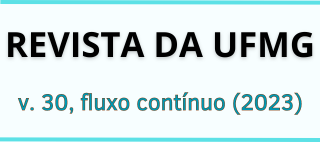The artificial intelligence represented in Genshin Impact, regulatory initiatives and algorithmic literacy
DOI:
https://doi.org/10.35699/2965-6931.2023.47558Keywords:
communication, artificial intelligence, Genshin Impact, literacy, algorithmsAbstract
One of the stories in the game Genshin Impact features an artificial intelligence, called Akasha, used by citizens and academics in the Sumeru region. The protagonist of the story, a traveler named Aether and his partner Paimon, arrive in the region and start using a device that connects them to the big data of Akasha; the story symbolically has a gradation that passes through both technophilia and technodeterminism (Bernard Miège). It is based on this symbolic character that, using exploratory research with an emphasis on content analysis – the mission dialogues – we transpose these elements to reality, seeking to punctuate governmental regulatory initiatives on artificial intelligence (European Union, United States, Brazil), as well as non-governmental ones (Future of Life Institute). Finally, we look at the communication science approaches to the subject (Lucia Santaella, David Gunkel et al.) and conclude that transdisciplinarity and algorithmic literacy are essential.
Downloads
References
BARTZ, Diane. Senado dos EUA realizará audiências sobre o uso de inteligência artificial. CNN / Reuters, 23 jun. 2023. Disponível em: https://www.cnnbrasil.com.br/tecnologia/senado-dos-eua-realizara-audiencias-sobre-o-uso-de-inteligencia-artificial/. Acesso em: 2 ago. 2023.
BRASIL. Projeto de lei da Câmara dos Deputados n. 21, de 2020: estabelece princípios, direitos e deveres para o uso de inteligência artificial no Brasil, e dá outras providências. Brasília: Senado Federal, 2021.
___. Projeto de lei n. 2338, de 2023: dispõe sobre o uso da Inteligência Artificial. Brasília: Senado Federal, 2023.
BURGUESS, Jean.; GREEN, Joshua. YouTube e a revolução digital: como o maior fenômeno da cultura participativa transformou a mídia e a sociedade. São Paulo: Aleph, 2009.
CARDOZO, Missila; FERRARI, Pollyana; BOARINI, Margareth. A inteligência artificial reconfigura a dinâmica comunicacional. Paradoxos, Uberlândia, v. 5, n. 1, p. 49-65, jan./jun. 2020. DOI: http://doi.org/10.14393/par-v5n1-2020-54430. Acesso em: 10 jun. 2023.
COMISSÃO EUROPEIA. Proposta de Regulamento do Parlamento Europeu e do Conselho que estabelece regras harmonizadas em matéria de inteligência artificial (Regulamento Inteligência Artificial) e altera determinados atos legislativos da União. Bruxelas: Comissão Europeia.
FORNASIER, Mateus de Oliveira; BECK, Cesar. Cambridge Analytica: escândalo, legado e possíveis futuros para a democracia. Revista Direito em Debate, v. 29, n. 53, p. 182-195, jan./jun. 2020. DOI: https://doi.org/10.21527/2176-6622.2020.53.182-195. Acesso em: 12 jul. 2023.
FUJIHARA, Masahito; SHIBUYA, Akiko. How is the gacha system reported on in Japan? Proceedings of DiGRA, p. 1-5, jun. 2020. Disponível em: http://www.digra.org/wp-content/uploads/digital-library/DiGRA_2020_paper_89.pdf. Acesso em: 25 jul. 2023.
FUTURE OF LIFE INSTITUTE. Pause Giant AI Experiments: An Open Letter. [S. l.]: Future of Life Institute, 22 mar. 2023. Disponível em: https://futureoflife.org/open-letter/pause-giant-ai-experiments/. Acesso em: 25 jul. 2023.
GUNKEL, David. Comunicação e inteligência artificial: novos desafios e oportunidades para a pesquisa em comunicação. Galáxia, São Paulo, n. 34, jan./abr. 2017, p. 05-19. DOI: dx.doi.org/10.1590/1982-2554201730816. Acesso em: 20 jul. 2023.
HJARVARD, Stig. A midiatização da cultura e da sociedade. São Leopoldo: Ed. Unisinos, 2014.
JENKINS, Henry. Cultura da convergência. São Paulo: Aleph,2009.
LANGER, Johnni. O mito do dragão na Escandinávia parte dois: as Eddas e o sistema ragnarokiano. Brathair – Revista de Estudos Celtas e Germânicos, v. 7, n. 1, p. 59-95, 2007. Disponível em: https://ppg.revistas.uema.br/index.php/brathair/article/view/550. Acesso em: 20 jul. 2023.
LÉVY, Pierre. A inteligência coletiva: por uma antropologia do ciberespaço. São Paulo: Loyola, 2003.
LOBO, Luiz Carlos. Inteligência artificial, o futuro da medicina e a educação médica. Revista Brasileira de Educação Médica, v. 42, n. 3, p. 3-8, 2018. DOI: http://dx.doi.org/10.1590/1981-52712015v42n3RB20180115EDITORIAL1. Acesso em: 2 jul. 2023.
MAGNO, Maria Ignes Carlos; ROMANCINI, Richard. A inteligência artificial, a inteligência humana e a pesquisa em comunicação. MATRIZes, v. 17, n. 1, p. 3-8, jan./abr. 2023. DOI: http://dx.doi.org/10.11606/issn.1982-8160.v17i1p3-8. Acesso em: 23 jul. 2023.
NORVIG, Peter; RUSSEL, Stuart Jonathan. Inteligência artificial. Rio de Janeiro: Elsevier, 2013.
PARREIRA, Artur; LEHMANN, Lúcia; OLIVEIRA, Mariana. O desafio das tecnologias de inteligência artificial na educação: percepção e avaliação dos professores. Ensaio: avaliação e políticas públicas em educação, Rio de Janeiro, v. 29, n. 113, p. 975-999, out./dez. 2021. DOI: https://doi.org/10.1590/S0104-40362020002803115. Acesso em: 25 jul. 2023.
SANTAELLA, Lucia. Novos desafios da comunicação. Lumina, Juiz de Fora, v. 4, n. 1, p. 1-10, jan./jun. 2001. Disponível em: https://www.ufjf.br/facom/files/2013/03/R5-Lucia.pdf. Acesso em: 2 jun. 2023.
_____. Pensar a inteligência artificial: cultura de plataforma e desafios à criatividade. Belo Horizonte: UFMG, 2023. Disponível em: https://seloppgcomufmg.com.br/publicacao/pensar-a-inteligencia-artificial-cultura-de-plataforma-e-desafios-a-criatividade/. Acesso em: 20 jul. 2023.
SOUSSUMI, Yusaku. Por uma psicanálise em tempos de multiverso. Revista Multiverso, v. 1, n. 1, p. 206-217, 2018. Disponível em: https://www.bivipsi.org/wp-content/uploads/NPAracaju-multiverso-2018-v1-n1-20.pdf. Acesso em: 3 jul. 2023.
STAIR, Ralph M.; REYNOLDS, George W. Princípios de sistemas de informação. São Paulo: Cengage Learning, 2015.
STOLLER, Gregory [et al.]. miHoYo: the open-world journey of an Otaku. Academy of Asian Business Review, v. 8, n. 2, p. 33-60, 2022. DOI: https://doi.org/10.26816/aabr.8.2.202212.33. Acesso em: 1 jun. 2023.
WIENER, Norbert. Cibernética e sociedade: o uso humano de seres humanos. São Paulo: Cultrix,1968.




